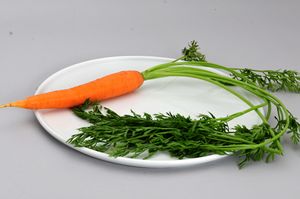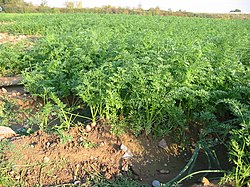Note: This is a project under development. The articles on this wiki are just being initiated and broadly incomplete. You can Help creating new pages.
Difference between revisions of "Daucus carota - Garjarah"
(→External Links) |
(→Identification) |
||
| (14 intermediate revisions by 2 users not shown) | |||
| Line 1: | Line 1: | ||
| − | |||
| − | |||
[[File:13-08-31-wien-redaktionstreffen-EuT-by-Bi-frie-037.jpg|thumb|right|''Carrot'', ''Garjarah'']] | [[File:13-08-31-wien-redaktionstreffen-EuT-by-Bi-frie-037.jpg|thumb|right|''Carrot'', ''Garjarah'']] | ||
| − | + | The '''Daucus carota''' is a root vegetable usually orange in colour. Carrots are a domesticated form of the wild carrot Daucus carota. It is native to Europe and southwestern Asia. The plant probably originated in Persia and was originally cultivated for its leaves and seeds. | |
| − | The | ||
| − | |||
==Uses== | ==Uses== | ||
{{Uses|Wounds}}, {{Uses|Cuts}}, {{Uses|Snakebites}}, {{Uses|Curing liver disorders}}, {{Uses|Skin eruptions}}, {{Uses|Blotches}}, {{Uses|Pimples}}, {{Uses|Diarrhea}}, {{Uses|Sore throats}} | {{Uses|Wounds}}, {{Uses|Cuts}}, {{Uses|Snakebites}}, {{Uses|Curing liver disorders}}, {{Uses|Skin eruptions}}, {{Uses|Blotches}}, {{Uses|Pimples}}, {{Uses|Diarrhea}}, {{Uses|Sore throats}} | ||
==Parts Used== | ==Parts Used== | ||
| − | {{Parts Used|Dried | + | {{Parts Used|Dried folaige}}, {{Parts Used|Whole herb}}. |
==Chemical Composition== | ==Chemical Composition== | ||
| Line 15: | Line 11: | ||
==Common names== | ==Common names== | ||
| − | {{Common names|kn=|ml=|sa=|ta=|te=|hi=|en= | + | {{Common names|kn=Gajjari|ml=|sa=Garjarah|ta=|te=|hi=|en=Carrot}} |
| + | |||
| + | ==Properties== | ||
| + | Reference: Dravya - Substance, Rasa - Taste, Guna - Qualities, Veerya - Potency, Vipaka - Post-digesion effect, Karma - Pharmacological activity, Prabhava - Therepeutics. | ||
| + | ===Dravya=== | ||
| + | |||
| + | ===Rasa=== | ||
| + | Tikta (Bitter), Madhura (Sweet) | ||
| + | ===Guna=== | ||
| + | Laghu (Light), Tikshna (Sharp) | ||
| + | ===Veerya=== | ||
| + | Ushna (Hot) | ||
| + | ===Vipaka=== | ||
| + | Madhura (Sweet) | ||
| + | ===Karma=== | ||
| + | Kapha, Vata | ||
| + | ===Prabhava=== | ||
==Habit== | ==Habit== | ||
| Line 22: | Line 34: | ||
==Identification== | ==Identification== | ||
===Leaf=== | ===Leaf=== | ||
| − | {{Leaf|Simple| | + | {{Leaf|Simple|Alternate|Leaflets are lobed and bright greyish green in colou}} |
===Flower=== | ===Flower=== | ||
| Line 28: | Line 40: | ||
===Fruit=== | ===Fruit=== | ||
| − | {{Fruit| | + | {{Fruit|Oval|2–4 mm length|Fruits are schizocarps|Reddish in colour and brittle when dry|Nil}} |
===Other features=== | ===Other features=== | ||
| Line 43: | Line 55: | ||
==Commonly seen growing in areas== | ==Commonly seen growing in areas== | ||
| − | {{Commonly seen|Tall grasslands}}, {{Commonly seen| | + | {{Commonly seen|Tall grasslands}}, {{Commonly seen|Meadows}}, {{Commonly seen|Borders of forests and fields}}. |
==Photo Gallery== | ==Photo Gallery== | ||
<gallery class="left" caption="" widths="140px" heights="140px"> | <gallery class="left" caption="" widths="140px" heights="140px"> | ||
| − | + | Blütenstand Karotte.jpg|Flower | |
| − | + | Carott 20041012 2598.jpg|Field | |
| − | Blütenstand Karotte.jpg | + | Carotts (Daucus Carotta).jpg|Fruit |
| − | + | Carrot harvest.jpg|Whole herb | |
| − | + | Carrot seeds.jpg|Seeds | |
| − | Carott 20041012 2598.jpg | ||
| − | |||
| − | |||
| − | Carotts (Daucus Carotta).jpg | ||
| − | |||
| − | |||
| − | Carrot harvest.jpg | ||
| − | |||
| − | |||
| − | Carrot seeds.jpg | ||
| − | |||
| − | |||
| − | |||
| − | |||
</gallery> | </gallery> | ||
==References== | ==References== | ||
| − | |||
<references> | <references> | ||
| − | <ref name="chemical composition">[https://link.springer.com/article/10.1007%2FBF01099047 | + | <ref name="chemical composition">[https://link.springer.com/article/10.1007%2FBF01099047 Chemical constituents]</ref> |
| − | + | <ref name="How to plant/cultivate">[https://www.rodalesorganiclife.com/garden/how-to-grow-carrots HOW TO PLANT]</ref> | |
| − | |||
| − | |||
| − | <ref name="How to plant/cultivate">[https://www.rodalesorganiclife.com/garden/how-to-grow-carrots | ||
</references> | </references> | ||
| Line 85: | Line 79: | ||
[[Category:Herbs]] | [[Category:Herbs]] | ||
| + | [[Category:Apiaceae]] | ||
Latest revision as of 18:34, 23 April 2020
The Daucus carota is a root vegetable usually orange in colour. Carrots are a domesticated form of the wild carrot Daucus carota. It is native to Europe and southwestern Asia. The plant probably originated in Persia and was originally cultivated for its leaves and seeds.
Contents
[hide]- 1 Uses
- 2 Parts Used
- 3 Chemical Composition
- 4 Common names
- 5 Properties
- 6 Habit
- 7 Identification
- 8 List of Ayurvedic medicine in which the herb is used
- 9 Where to get the saplings
- 10 Mode of Propagation
- 11 How to plant/cultivate
- 12 Commonly seen growing in areas
- 13 Photo Gallery
- 14 References
- 15 External Links
Uses
Wounds, Cuts, Snakebites, Curing liver disorders, Skin eruptions, Blotches, Pimples, Diarrhea, Sore throats
Parts Used
Chemical Composition
β-carotene, phenols and phosphorus contents were greater in local cultivars. A significant positive correlation between β-carotene[1]
Common names
| Language | Common name |
|---|---|
| Kannada | Gajjari |
| Hindi | |
| Malayalam | |
| Tamil | |
| Telugu | |
| Marathi | NA |
| Gujarathi | NA |
| Punjabi | NA |
| Kashmiri | NA |
| Sanskrit | Garjarah |
| English | Carrot |
Properties
Reference: Dravya - Substance, Rasa - Taste, Guna - Qualities, Veerya - Potency, Vipaka - Post-digesion effect, Karma - Pharmacological activity, Prabhava - Therepeutics.
Dravya
Rasa
Tikta (Bitter), Madhura (Sweet)
Guna
Laghu (Light), Tikshna (Sharp)
Veerya
Ushna (Hot)
Vipaka
Madhura (Sweet)
Karma
Kapha, Vata
Prabhava
Habit
Identification
Leaf
| Kind | Shape | Feature |
|---|---|---|
| Simple | Alternate | Leaflets are lobed and bright greyish green in colou |
Flower
| Type | Size | Color and composition | Stamen | More information |
|---|---|---|---|---|
| Unisexual | 4-7 mm in size | white | 5-20 | Flowers are small flowers with deep purple florets in the centre |
Fruit
| Type | Size | Mass | Appearance | Seeds | More information |
|---|---|---|---|---|---|
| Oval | 2–4 mm length | Fruits are schizocarps | Reddish in colour and brittle when dry | Nil | {{{6}}} |
Other features
List of Ayurvedic medicine in which the herb is used
- Vishatinduka Taila as root juice extract
Where to get the saplings
Mode of Propagation
How to plant/cultivate
To produce the best crop possible, double-dig your planting area or build up a raised bed[2]
Commonly seen growing in areas
Tall grasslands, Meadows, Borders of forests and fields.
Photo Gallery
References
External Links
- Ayurvedic Herbs known to be helpful to treat Wounds
- Ayurvedic Herbs known to be helpful to treat Cuts
- Ayurvedic Herbs known to be helpful to treat Snakebites
- Ayurvedic Herbs known to be helpful to treat Curing liver disorders
- Ayurvedic Herbs known to be helpful to treat Skin eruptions
- Ayurvedic Herbs known to be helpful to treat Blotches
- Ayurvedic Herbs known to be helpful to treat Pimples
- Ayurvedic Herbs known to be helpful to treat Diarrhea
- Ayurvedic Herbs known to be helpful to treat Sore throats
- Herbs with Dried folaige used in medicine
- Herbs with Whole herb used in medicine
- Herbs with common name in Kannada
- Herbs with common name in Sanskrit
- Herbs with common name in English
- Habit - Herb
- Index of Plants which can be propagated by Seeds
- Index of Plants which can be propagated by Cuttings
- Herbs that are commonly seen in the region of Tall grasslands
- Herbs that are commonly seen in the region of Meadows
- Herbs that are commonly seen in the region of Borders of forests and fields
- Herbs
- Apiaceae





